Intro
Discover perforated ovarian cyst symptoms, including pelvic pain, bleeding, and infertility issues, and learn about rupture risks, ovarian torsion, and treatment options for this complex womens health condition.
Ovarian cysts are a common condition that affects many women, and while they are often harmless, they can sometimes cause complications. A perforated ovarian cyst is a serious condition that requires immediate medical attention. In this article, we will explore the symptoms of a perforated ovarian cyst, its causes, diagnosis, treatment, and prevention.
Ovarian cysts are fluid-filled sacs that form on the ovaries, and they can be either benign or malignant. While most ovarian cysts are benign, they can still cause symptoms such as pelvic pain, bloating, and irregular menstrual periods. A perforated ovarian cyst occurs when the cyst ruptures, releasing its contents into the abdominal cavity. This can cause severe symptoms, including intense pain, nausea, vomiting, and fever.
The symptoms of a perforated ovarian cyst can vary from woman to woman, but common symptoms include severe pelvic pain, nausea, vomiting, fever, and abdominal tenderness. In some cases, women may experience symptoms such as heavy bleeding, dizziness, and fainting. If left untreated, a perforated ovarian cyst can lead to serious complications, including infection, abscesses, and infertility.
Causes of Perforated Ovarian Cyst
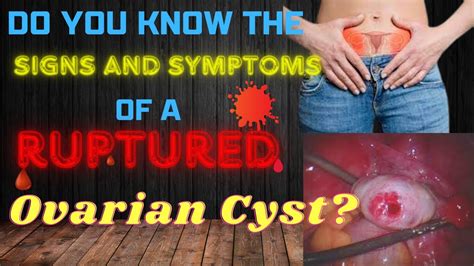
Risk Factors
Several risk factors can increase a woman's chances of developing a perforated ovarian cyst. These include: * Family history of ovarian cysts * Previous ovarian cysts * Endometriosis * Polycystic ovary syndrome (PCOS) * Hormonal changes * Ovulation * Trauma to the ovariesDiagnosis of Perforated Ovarian Cyst
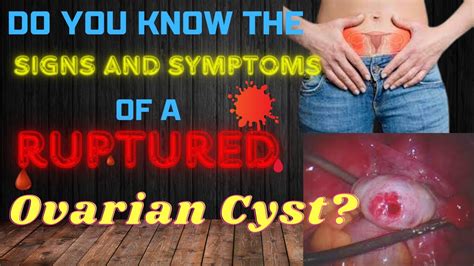
Diagnostic Tests
The following diagnostic tests may be used to diagnose a perforated ovarian cyst: * Pelvic exam * Ultrasound * CT scan * MRI scan * Laparoscopy * Blood tests to check for infection or inflammationTreatment of Perforated Ovarian Cyst

Treatment Options
The following treatment options may be used to treat a perforated ovarian cyst: * Surgery to remove the cyst and repair surrounding tissues * Antibiotics to prevent infection * Pain management medications to control pain and discomfort * Hospitalization to monitor the woman's condition and provide supportive carePrevention of Perforated Ovarian Cyst
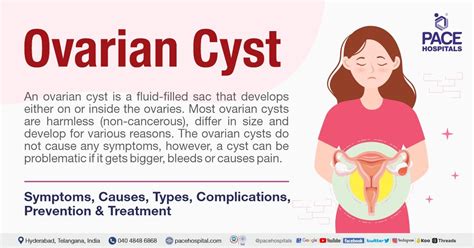
Reducing Risk Factors
The following steps can help reduce the risk factors for a perforated ovarian cyst: * Maintaining a healthy weight * Exercising regularly * Managing stress and getting enough sleep * Avoiding trauma to the ovaries * Practicing good reproductive healthComplications of Perforated Ovarian Cyst
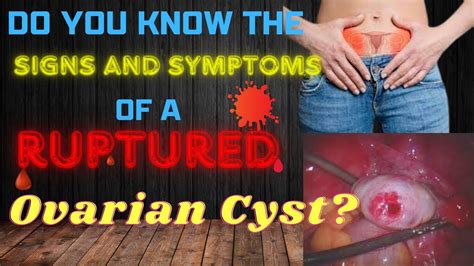
Possible Complications
The following complications can occur if a perforated ovarian cyst is left untreated: * Infection * Abscesses * Infertility * Sepsis * Adhesions and scar tissueLiving with Perforated Ovarian Cyst
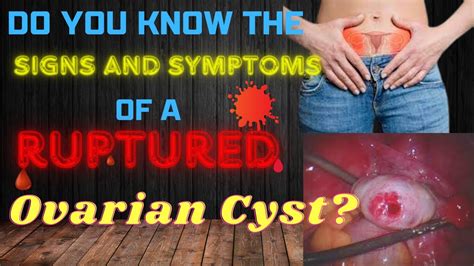
Coping with Symptoms
The following tips can help women cope with the symptoms of a perforated ovarian cyst: * Practicing good reproductive health * Maintaining a healthy weight * Managing stress and getting enough sleep * Using pain management medications to control pain and discomfort * Getting regular check-ups with a healthcare providerWhat are the symptoms of a perforated ovarian cyst?
+The symptoms of a perforated ovarian cyst can include severe pelvic pain, nausea, vomiting, fever, and abdominal tenderness.
How is a perforated ovarian cyst diagnosed?
+A perforated ovarian cyst is typically diagnosed with a physical exam, medical history, and imaging tests such as ultrasound, CT scans, and MRI scans.
What are the treatment options for a perforated ovarian cyst?
+The treatment options for a perforated ovarian cyst depend on the severity of the condition and the individual woman's needs, but may include surgery, antibiotics, and pain management medications.
Can a perforated ovarian cyst be prevented?
+While it is not always possible to prevent a perforated ovarian cyst, women can reduce their risk by practicing good reproductive health, maintaining a healthy weight, and managing stress and getting enough sleep.
What are the complications of a perforated ovarian cyst?
+If left untreated, a perforated ovarian cyst can lead to serious complications, including infection, abscesses, and infertility.
In conclusion, a perforated ovarian cyst is a serious condition that requires immediate medical attention. By understanding the symptoms, causes, diagnosis, treatment, and prevention of a perforated ovarian cyst, women can take steps to reduce their risk and manage their symptoms. If you suspect that you may have a perforated ovarian cyst, it is essential to seek medical attention right away. We encourage you to share this article with others and to comment below with any questions or concerns you may have.
